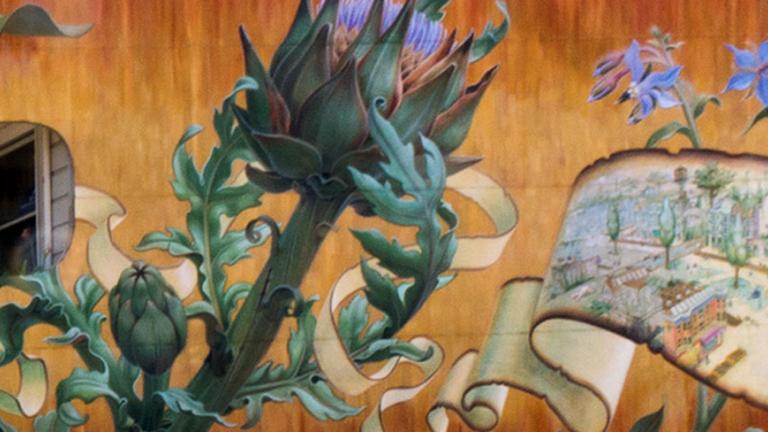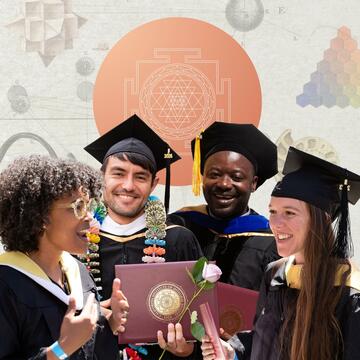CIIS will celebrate the Class of 2025 on Saturday, May 17 at 1 p.m. PDT at A.C.T.'s Toni Rembe Theater in San Francisco.

1968 Revisited: Whatever Happened to Revolution, Counterculture, Pedagogy, Utopia?
East-West Psychology conference explores the ideas and forces surrounding the founding of CIIS.
In September 2018, the East-West Psychology department hosted a conference to explore the ideas and forces surrounding the founding of CIIS in 1968: A worldwide discontent with the conditions of human living, and the dream of a creative utopia.
The aim of the conference was to seek common threads uniting the academic foundations of a new pedagogy, a greater psychology, and an experimental philosophy with the global uprisings, the West Coast counterculture, and the founding of Auroville, a utopian spiritual community in India. (Auroville was started by the Mother, the spiritual companion of Sri Aurobindo, a philosopher-sage of modern India who was the teacher of Haridas Chaudhuri, a founder of CIIS.)
The conference fielded a number of questions: Was idealism fated to be co-opted by capital and selfishness? Could education act as a counterforce to this gravitation? What kind of education is the call of the hour? Can Auroville teach us something about the living potential of utopia? How can we reignite the revolutionary content of CIIS, which served in many ways as a secret think-tank for the San Francisco counterculture during that period?
Scholars Come Together
The conference brought together scholars in utopian and counterculture studies, experimental philosophy, integral education, eastern spirituality, feminism, ecophilosophy, and transpersonal psychology. It included visiting resident scholars from Auroville, who outlined the philosophical, sociological, ecological, educational, political, and spiritual dimensions of the intentional city.
Mike Hebel, a CIIS Trustee who was also the conference's principal donor, introduced the event. Speaking about the year 1968, Hebel said, "From the burgeoning anti-Vietnam war and Civil Rights movements in the U.S. to protests and revolutions in Europe, the world would never be the same." Hebel was followed by keynote speaker George Katsiaficas, a prominent utopian activist-scholar who recently published a seminal book, The Global Imagination of 1968.
The Auroville guests played a major role at the conference. CIIS alumnus Bindu Mohanty, who earned her Ph.D. in East-West Psychology at CIIS several years ago, served as a bridge between CIIS and Auroville. Suryamayi Aswimi, another Aurovilian who is a doctoral candidate at the University of Sussex, led an Awareness Through the Body (ATB) workshop. A photo exhibition on Auroville, curated by Debashish Banerji, illustrated the city's ongoing efforts at manifesting an integral ecology and psychology. (The Aurovilian guests' travel was made possible by Auroville International, a worldwide body supporting the activities of the community.)
Music and Meaning
A jazz concert by the Reimagination Trio was another conference highlight. The trio, led by East-West Psychology graduate student Jonathan Kay, explored the fertile dialogue between Afro-American jazz and Indian classical music, one of the myriad cultural experiments of the 1968 era.
There was also a dynamic session on integral education which included CIIS Provost Liz Beaven, who is an expert in Waldorf education; Heidi Fraser-Hageman, Director of the Center for Writing and Scholarship, who completed her Ph.D. on Integral Education in the East-West Psychology program; Suryamayi Aswini; and Jean Eisele, an educator in integral education from the University of Washington.
CIIS Then and Now
The conference concluded with a conversation about 1968 and the future of CIIS. Participants included two prominent figures from the University's early years: Robert McDermott, CIIS President Emeritus, who knew and collaborated with Haridas Chaudhuri; and Michael Murphy, co-founder of Esalen, who was also influenced by CIIS founders Chaudhuri and Frederic Spiegelberg.
McDermott and Murphy pointed out that Chaudhuri founded CIIS to facilitate Sri Aurobindo's vision of the emergence of a global participatory spiritual civilization —an aspiration that took many different forms in 1968. The two iterated the need for CIIS to carry on and fortify this vision in our current — very different — era. Provost Beaven may have put it best when she characterized the conference as "a deep watering of the University's roots." The conference concluded on a hopeful note while leaving deep seeds for reflection and action for the future of CIIS.
Related Academic Program
Related News
CIIS has joined hundreds of colleges and universities across the country in signing “A Call for Constructive Engagement.”
Join CIIS to celebrate Jung’s legacy and explore his psychology’s impact on growth, healing, and cultural change in challenging times.



